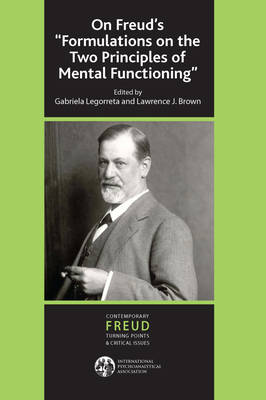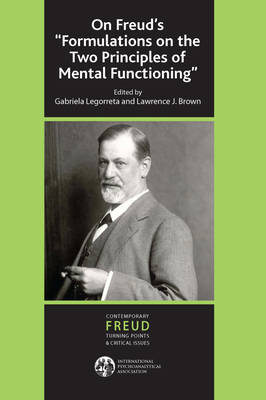
- Afhalen na 1 uur in een winkel met voorraad
- Gratis thuislevering in België vanaf € 30
- Ruim aanbod met 7 miljoen producten
- Afhalen na 1 uur in een winkel met voorraad
- Gratis thuislevering in België vanaf € 30
- Ruim aanbod met 7 miljoen producten
Zoeken
On Freud's ''Formulations on the Two Principles of Mental Functioning''
€ 162,45
+ 324 punten
Omschrijving
This book is a collection of papers by leading contemporary psychoanalysts who comment on the continuing important relevance of Freud's (1911) paper, Formulations on the Two Principles of Mental Functioning. The contributors gathered here represent current European, Latin American, and North American perspectives that elaborate the continuing value of Two Principles for present-day psychoanalytic thinking. Each author examines Freud's paper through a personal lens that is coloured by the psychoanalytic culture from which he or she comes. In each instance, the writers' chapters demonstrate the heuristic value of Two Principles for twenty-first century psychoanalytic theory and technique. A common thread that runs through all the chapters is the view that this brief paper by Freud, which he humbly introduced by stating, "The deficiencies of this short paper, which is preparatory rather than expository ...", is a masterpiece that contains within it the seeds of much of his later writing. The distinction he draws between the pleasure principle and the reality principle are profound and raise questions that still preoccupy analysis today.
Specificaties
Betrokkenen
- Uitgeverij:
Inhoud
- Aantal bladzijden:
- 286
- Taal:
- Engels
- Reeks:
Eigenschappen
- Productcode (EAN):
- 9780367103484
- Verschijningsdatum:
- 5/07/2019
- Uitvoering:
- Hardcover
- Formaat:
- Genaaid
- Afmetingen:
- 157 mm x 231 mm
- Gewicht:
- 635 g

Alleen bij Standaard Boekhandel
+ 324 punten op je klantenkaart van Standaard Boekhandel
Beoordelingen
We publiceren alleen reviews die voldoen aan de voorwaarden voor reviews. Bekijk onze voorwaarden voor reviews.










